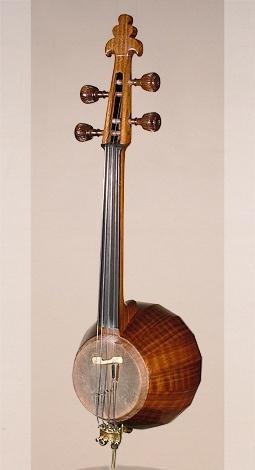
The kamānche or kamāncha (Persian: کمانچه ) is a Persian/Iranian bowed stringed instrument related to the bowed rebab, the historical ancestor of the kamancheh and also to the bowed lira of the Byzantine Empire, ancestor of the European violin family.
The strings are played with a variable-tension bow: the word "kamancheh" means "little bow" in Persian (kæman, bow, and -cheh, diminutive). It is widely used in the classical music of Iran, Armenia, Azerbaijan,Uzbekistan and Turkmenistan, with slight variations in the structure of the instrument.
Traditionally kamanchehs had three silk strings, but modern ones have four metal ones. Kamanchehs may have highly ornate inlays and fancy carved ivorytuning pegs. The body has a long upper neck and a lower bowl-shaped resonating chamber made from a gourd or wood, usually covered with a membrane, made from the skin of a lamb, goat or sometimes fish, on which the bridge is set. From the bottom protrudes a spike to support the kamancheh while it is being played, hence in English the instrument is sometimes called the spiked fiddle. It is played sitting down held like a cello though it is about the length of a viola. The end-pin can rest on the knee or thigh while seated in a chair.
Famous Iranian kamancheh players include Ali-Asghar Bahari, Ardeshir Kamkar, Saeed Farajpouri, and Kayhan Kalhor. Famous Azeri kamancheh player is Habil Aliev.
The Turkish and Armenian kemenche or kemençe is a bowed string instrument with a very similar or identical name—but it differs significantly in structure and sound from the Persian kamancheh. Other bowed string instruments akin to the kamancheh, yet differing more than slightly from it, include the kemenche of the Pontic Greeks of the black Sea, the old Russian Gudok, the Persian Ghaychak, and the Kazakh Kobyz.
Persian traditional classical music also uses the ordinary violin with Persian tuning. The kamancheh and the ordinary violin are tuned in the same way and have the same range but different timbres due to their differing sound boxes.
A kamancheh is depicted on the reverse of the Azerbaijani 1 qəpik coin minted since 2006 and on the obverse of the Azerbaijani 1 manat banknote issued since 2006.
Iranian Kamanche
Kamancheh is an striking instrument that you can find almost in every region in Iran.
Parts of Kamancheh are:
1.Bowl (Walnut, Mulberry and maple wood)
2.Neck (walnut wood)
3.Tuning pegs ( walnut wood)
4.Fingerboard ( Indian rosewood)
5.Nut (ebony)